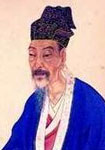“驰心拱北辰”的意思及全诗出处和翻译赏析
“驰心拱北辰”全诗
济时成国器,乐道任天真。
特达圭无玷,坚贞竹有筠。
总戎宽得众,市义贵能贫。
护塞无南牧,驰心拱北辰。
乞身来阙下,赐告卧漳滨。
荣耀初题剑,清羸已拖绅。
宫星徒列位,隙日不回轮。
自昔追飞侣,今为侍从臣。
素弦哀已绝,青简叹犹新。
未遂挥金乐,空悲撤瑟晨。
凄凉竹林下,无复见清尘。
分类:
作者简介(刘禹锡)

刘禹锡(772-842),字梦得,汉族,中国唐朝彭城(今徐州)人,祖籍洛阳,唐朝文学家,哲学家,自称是汉中山靖王后裔,曾任监察御史,是王叔文政治改革集团的一员。唐代中晚期著名诗人,有“诗豪”之称。他的家庭是一个世代以儒学相传的书香门第。政治上主张革新,是王叔文派政治革新活动的中心人物之一。后来永贞革新失败被贬为朗州司马(今湖南常德)。据湖南常德历史学家、收藏家周新国先生考证刘禹锡被贬为朗州司马其间写了著名的“汉寿城春望”。
《许给事见示哭工部刘尚书诗因命同作》刘禹锡 翻译、赏析和诗意
《许给事见示哭工部刘尚书诗因命同作》是唐代刘禹锡创作的一首诗词。以下是它的中文译文、诗意和赏析:
中文译文:
汉室贤王后,孔门高第人。
济时成国器,乐道任天真。
特达圭无玷,坚贞竹有筠。
总戎宽得众,市义贵能贫。
护塞无南牧,驰心拱北辰。
乞身来阙下,赐告卧漳滨。
荣耀初题剑,清羸已拖绅。
宫星徒列位,隙日不回轮。
自昔追飞侣,今为侍从臣。
素弦哀已绝,青简叹犹新。
未遂挥金乐,空悲撤瑟晨。
凄凉竹林下,无复见清尘。
诗意:
这首诗以哭悼工部尚书刘君的方式,表达了作者刘禹锡对于时代的变迁和个人命运的感慨。诗中描绘了汉室贤王后和孔门的高才子,他们在历史的舞台上发挥了重要的作用。他们以清廉的品德和坚守正道的精神,成为了济世奉公的楷模。诗人借用特达圭无玷和坚贞竹有筠的比喻,来形容这些伟大的人物。他们总结了戎事,使国家安定,尊重市井的道德准则,珍视贫穷但有能力的人。诗人抱怨说,现在没有人保护边塞,也没有人追求北辰的道德标准。他请求能够进入朝廷,向皇帝陈述自己的忧虑。他感叹自己曾经有过的荣耀,但如今已经衰颓。宫殿中的星星只是虚位,太阳在天空中不再回转。诗人自称曾经追随令人羡慕的飞侣,但现在只是一个随从臣子。他的琴弦不再奏响悲伤的音乐,他的官职已经荒废。他感叹着在凄凉的竹林下,再也看不到清新的尘土。
赏析:
这首诗词展示了刘禹锡对于时代变迁和个人命运的悲凉感受。他通过对贤王后和孔门高第人的赞美,表达了对过去时代高尚人物的向往与怀念。诗中对于道德准则的重视以及对于贫穷但有能力之人的尊重,展示了作者对于公正和正义的追求。然而,诗人也表达了对于现实社会的失望和不满,认为当前的政治环境已经不能保护边塞,也没有人追求高尚的道德。他希望能够进入朝廷,向皇帝陈述自己的忧虑,但他的愿望未能实现。整首诗以凄凉的氛围为主调,通过描绘竹林下的荒寂和清尘的消失,表达了诗人内心的孤寂和失落。
《许给事见示哭工部刘尚书诗因命同作》 is a poem written by Liu Yuxi during the Tang Dynasty. Here is the Chinese translation, poetic meaning, and analysis of the poem:
Chinese Translation:
汉室贤王后,孔门高第人。
济时成国器,乐道任天真。
特达圭无玷,坚贞竹有筠。
总戎宽得众,市义贵能贫。
护塞无南牧,驰心拱北辰。
乞身来阙下,赐告卧漳滨。
荣耀初题剑,清羸已拖绅。
宫星徒列位,隙日不回轮。
自昔追飞侣,今为侍从臣。
素弦哀已绝,青简叹犹新。
未遂挥金乐,空悲撤瑟晨。
凄凉竹林下,无复见清尘。
Poetic Meaning:
This poem, "In Response to Seeing the Mourning of Minister Liu from the Ministry of Works, as Ordered to Write Together," expresses Liu Yuxi's feelings about the changes in the era and his personal fate. The poem portrays the virtuous princes of the Han dynasty and scholars from the Confucian school who played significant roles in history. They were paragons of integrity and dedicated themselves to the pursuit of truth. The poem uses the metaphors of flawless jade and steadfast bamboo to describe these great figures. They contributed to the stability of the nation and upheld the moral principles cherished by the common people, valuing the abilities of the poor. The poet laments that there are no longer protectors of the borders, and the pursuit of moral excellence symbolized by the Northern Star has been neglected. He pleads to be allowed into the court to express his concerns to the emperor. He sighs about the fading glory he once experienced, and the insignificance of the palace stars that do not revolve with the passing days. The poet used to chase after admirable companions, but now he is merely a subordinate. The strings of his musical instrument no longer produce mournful melodies, and his official position has become neglected. He laments the desolation beneath the bamboo grove and the absence of the once-clear dust.
Analysis:
This poem showcases Liu Yuxi's lamentations about the changes in the era and his personal fate. Through his praise of the virtuous princes and scholars of the Confucian school, he expresses his longing and nostalgia for the noble figures of the past. The poem emphasizes the importance of moral principles and the respect for capable individuals, particularly those who are poor. This reflects the poet's pursuit of justice and righteousness. However, the poet also expresses disappointment and dissatisfaction with the current social reality, where the political environment fails to protect the borders and uphold moral excellence. He desires to enter the court and share his concerns with the emperor, but his wishes remain unfulfilled. The poem exudes a sense of desolation throughout, depicting the emptiness beneath the bamboo grove and the disappearance of the once-clear dust, conveying the poet's solitude and sense of loss.
“驰心拱北辰”全诗拼音读音对照参考
xǔ jǐ shì jiàn shì kū gōng bù liú shàng shū shī yīn mìng tóng zuò
许给事见示哭工部刘尚书诗因命同作
hàn shì xián wáng hòu, kǒng mén gāo dì rén.
汉室贤王后,孔门高第人。
jì shí chéng guó qì, lè dào rèn tiān zhēn.
济时成国器,乐道任天真。
tè dá guī wú diàn, jiān zhēn zhú yǒu yún.
特达圭无玷,坚贞竹有筠。
zǒng róng kuān dé zhòng, shì yì guì néng pín.
总戎宽得众,市义贵能贫。
hù sāi wú nán mù, chí xīn gǒng běi chén.
护塞无南牧,驰心拱北辰。
qǐ shēn lái què xià, cì gào wò zhāng bīn.
乞身来阙下,赐告卧漳滨。
róng yào chū tí jiàn, qīng léi yǐ tuō shēn.
荣耀初题剑,清羸已拖绅。
gōng xīng tú liè wèi, xì rì bù huí lún.
宫星徒列位,隙日不回轮。
zì xī zhuī fēi lǚ, jīn wèi shì cóng chén.
自昔追飞侣,今为侍从臣。
sù xián āi yǐ jué, qīng jiǎn tàn yóu xīn.
素弦哀已绝,青简叹犹新。
wèi suì huī jīn lè, kōng bēi chè sè chén.
未遂挥金乐,空悲撤瑟晨。
qī liáng zhú lín xià, wú fù jiàn qīng chén.
凄凉竹林下,无复见清尘。
“驰心拱北辰”平仄韵脚
平仄:平平仄仄平
韵脚:(平韵) 上平十一真 * 平仄拼音来自网络,仅供参考;诗句韵脚有多个的时候,对比全诗即可判断。